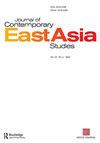Shift in China’s commitment to regional environmental governance in Northeast Asia?
IF 1.4
Q1 AREA STUDIES
引用次数: 9
Abstract
ABSTRACT This article examines how China’s economic and social development has influenced its commitment to regional environmental governance in Northeast Asia. Environmental problems in China have drawn cross-border attention, and China must address these serious problems. On the other hand, China is a unique country in East Asia because it has succeeded in growing its economy and competing in an international marketplace while also maintaining an authoritarian regime. Considering this unique position in the region, how can China solve common environmental challenges in a cooperative manner? What factors have affected cross-border cooperation with China’s counterparts? This article points out that there are two principles found in environmental diplomacy in China: common but differentiated responsibility in global environmental issues and building friendship and partnerships with neighboring countries. These principles have affected China’s commitment to regional environmental cooperation in the way of mixture of modest and defensive attitudes. Moreover, in the context of regional environmental cooperation in Northeast Asia, the article argues that Japan has been an important factor for China to learn Japanese experiences as well as to enjoy Japan’s affluent financial assistance. Recent economic and social development in China has made its commitment more positive in global environmental cooperation on the one hand and more uncertain in terms of regional environmental governance on the other hand. The transnational network of non-state actors is now limited in their opportunities to commit to the regional environmental governance; however, there can be hope for sustainable future in terms of neighboring partnerships.中国对东北亚区域环境治理的承诺有何转变?
本文考察了中国的经济和社会发展如何影响其对东北亚区域环境治理的承诺。中国的环境问题已经引起了国际社会的关注,中国必须解决这些严重的问题。另一方面,中国是东亚独特的国家,因为它成功地发展了经济,并在国际市场上竞争,同时也保持了独裁政权。考虑到中国在该地区的独特地位,中国如何以合作的方式解决共同的环境挑战?哪些因素影响了与中国同行的跨境合作?本文指出,中国的环境外交有两个原则:在全球环境问题上承担共同但有区别的责任,与周边国家建立友好伙伴关系。这些原则影响了中国对区域环境合作的承诺,其态度既温和又有防御。此外,在东北亚区域环境合作的背景下,日本已成为中国学习日本经验并享受日本丰厚财政援助的重要因素。中国近年来的经济社会发展,一方面使其在全球环境合作中的承诺更加积极,另一方面使其在区域环境治理方面的承诺更加不确定。非国家行为体的跨国网络现在致力于区域环境治理的机会有限;然而,就邻国伙伴关系而言,可持续的未来是有希望的。
本文章由计算机程序翻译,如有差异,请以英文原文为准。
求助全文
约1分钟内获得全文
求助全文
来源期刊

Journal of Contemporary East Asia Studies
Social Sciences-Cultural Studies
CiteScore
2.50
自引率
0.00%
发文量
10
审稿时长
6 weeks
 求助内容:
求助内容: 应助结果提醒方式:
应助结果提醒方式:


